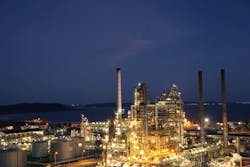Petrobras inks official deal for sale of RLAM refinery, related assets
Petróleo Brasileiro SA (Petrobras) has formally approved its previously proposed sale of the 333,000-b/d Refinaria Landulpho Alves (RLAM) refinery in São Francisco do Conde in the Recôncavo Baiano region of Bahia, Brazil, to Mubadala Capital (MC), the investment arm of Abu Dhabi-based Mubadala Investment Co. (OGJ Online, Feb. 9, 2021; June 25, 2020; Mar. 20, 2020).
As part of the purchase and sale agreement signed late on Mar. 24, Petrobras will sell its shares in the RLAM refinery and related assets—including four storage terminals and a set of pipelines totaling 669 km—to MC Brazil Downstream Participações for $1.65 billion, pending adjustments to the sale price due to variations in working capital, net debt, and investments that may arise between now and official closing of the transaction, Petrobras said.
The sale also remains subject to compliance with other customary precedent conditions, such as approval by Brazil’s Administrative Council for Economic Defense (CADE) per Petrobras’s June 2019 agreement with CADE governing the operator’s ongoing program to divest most of its Brazilian refining and related logistics assets, as well as the opening of Brazil’s refining sector to increased competitiveness and transparency (OGJ Online, Oct. 25, 2019; June 12, 2019; May 2, 2019).
Petrobras—which will continue operating RLAM and its associated assets until all conditions precedent are met and the transaction closes—said it will also offer ongoing support to Mubadala for a transitional period following the sale as part of a service agreement to ensure ongoing safety and uninterrupted operations of the assets.
“The divestment of RLAM contributes to the improvement of capital allocation, reduction of the still-high indebtedness, and [start of] a process of reducing the risks of political interventions in fuel pricing, which [previously] caused so much damage to Petrobras and to the Brazilian economy itself,” said Roberto Castello Branco, Petrobras’s chief executive officer.
Branco additionally noted that, while monopolies may still exist in other sectors of the Brazilian economy, Petrobras’s deal for the sale of RLAM marks the beginning of the end of a monopoly in Brazil’s refining sector.
While Petrobras disclosed no details regarding a timeframe for when it anticipates finalizing the RLAM transaction, the operator did confirm the competitive sales process remains under way for the other seven refining assets involved in its downstream divestment program, including:
- The 208,000-b/d Refinaria Alberto Pasqualini (REFAP) refinery—with assets that include two storage terminals and a set of pipelines totaling 260 km—in Rio Grande do Sul.
- The 46,000-b/d Isaac Sabbá refinery (REMAN)—including a storage terminal—in Manaus, Amazonas.
- The 8,000-b/d Lubrificantes e Derivados de Petróleo do Nordeste (LUBNOR) refinery in Fortaleza, Ceará, which is one of the national leaders in asphalt production, as well as the only plant in Brazil to produce naphthenic lubricants.
- The 6,000-b/d Unidade de Industrialização do Xisto (SIX) unit—including a mine in one of the largest oil shale reserves in the world and a shale processing plant—in São Mateus do Sul, Paraná.
- The 166,000-b/d Refinaria Gabriel Passos (REGAP) refinery—including a set of pipelines of more than 720 km—in Betim, Minas Gerais.
- The 130,000-b/d Refinaria Abreu e Lima (RNEST) refinery—which has the potential to double its capacity 260,000 b/d with startup of a second processing line and includes both a terminal and a 101-km set of short pipelines—in Pernambuco.
Earlier this year, Petrobras said it had received a binding proposal from and was in the negotiation phase with Ultrapar Participações SA for REFAP, with binding offers received and ongoing negotiations with unidentified parties also under way for REMAN, LUBNOR, and SIX. The operator also said it expected binding offers for RNEST and REGAP sometime during first-quarter 2021.
About the Author
Robert Brelsford
Downstream Editor
Robert Brelsford joined Oil & Gas Journal in October 2013 as downstream technology editor after 8 years as a crude oil price and news reporter on spot crude transactions at the US Gulf Coast, West Coast, Canadian, and Latin American markets. He holds a BA (2000) in English from Rice University and an MS (2003) in education and social policy from Northwestern University.

